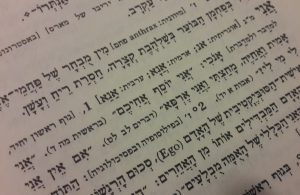
Photo by Ayana
Two first person pronouns for “I” appear in the Bible: אֲנִי and אָנוֹכִי. As in English both refer to a singular speaker, male or female. Although homiletic interpretations of the Bible try to differentiate the pronouns, literally they both mean I or me.
Here are two examples for each pronoun to illustrate the similarity of the meanings:
Examples for אֲנִי (A-ni)
1) (וַיֹּאמֶר אֲנִי יוֹסֵף אֲחִיכֶם” (בְּרֵאשִׁית 45, 4 ”
“And he said, I am Joseph your brother” (Genesis 45, 4).
2) A well-known proverb from the Talmud asserts: ?אִם אֵין אֲנִי לִי, מִי לִי
If I am not for myself who is for me?
Examples for אָנוֹכִי (A-no-chi)
1) (וַיֹּאמֶר לֹא יָדַעְתִּי הֲשֹׁמֵר אָחִי אָנֹכִי” (בְּרֵאשִׁית 4, 9 ”
“And he said, I know not: am I my brother’s keeper?” (Genesis 4, 9).
2) A well-known verse of the poet Yehuda Halevi (c. 1075 – 1141) begins
with the line: “לִבִּי בְמִזְרָח וְאָנֹכִי בְּסוֹף מַעֲרָב”. Which means: My heart is in
the east, and I am at the ends of the west.
In spite the similar meaning, nowadays spoken Hebrew uses only אֲנִי as the first person pronoun. Travelling in Israel, roaming her cities and streets, one won’t hear אָנוֹכִי. This pronoun considered archaic and remains in poems, literature and scriptures. Nonetheless it’s important to be familiar with this form of pronoun.





